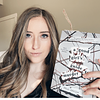Take a photo of a barcode or cover
Interesting points but a bit reductive.
Book Club. Quarantine Book.
Book Club. Quarantine Book.
Read this for work prior to a leadership development meeting (that has not occurred yet)
Taking the test beforehand was a nice way to hone in on where my focus has to be. The results were not a surprise to me but rather a good reminder of how to work on improving myself.
Taking the test beforehand was a nice way to hone in on where my focus has to be. The results were not a surprise to me but rather a good reminder of how to work on improving myself.
informative
reflective
fast-paced
My draft review was accidentally deleted. I don't care enough to rewrite it. In a few short words, self-help books are not for me. Bradberry literally regurgitated words I had been raised on and asked me to pay for them. 60-ish phases with obvious explanations apparently equals a best-selling self-help book. The test is ridiculously short for ascertaining such a complex concept as EQ.
However, I came to the conclusion that perhaps my opinion of self-help books is because I was raised and surrounded by these kinds of ideas. If someone never heard them before, perhaps this book would have been revolutionary in their lives. This is why I've opted for a 2-star rating - it's actually really good advice even if I didn't need to hear it.
One final thought. This was on the required high school reading list. I have mixed feelings about this but I think I'm leaning to the notion that this is a good idea. I imagine this may be very helpful in a group situation though I can equally imagine being the subject of a few jokes if a teenager asked their friend about their EQ between classes.
However, I came to the conclusion that perhaps my opinion of self-help books is because I was raised and surrounded by these kinds of ideas. If someone never heard them before, perhaps this book would have been revolutionary in their lives. This is why I've opted for a 2-star rating - it's actually really good advice even if I didn't need to hear it.
One final thought. This was on the required high school reading list. I have mixed feelings about this but I think I'm leaning to the notion that this is a good idea. I imagine this may be very helpful in a group situation though I can equally imagine being the subject of a few jokes if a teenager asked their friend about their EQ between classes.
Found a great new join in self-development book with this one. Really useful and practical.
Read this as an assigned reading for a biology class . . . Just no.
The book claims that intelligence and personality are fixed and cannot be changed, but that contradicts many studies that have documented otherwise. I completely disagree on the idea that intelligence cannot be increased, but the issue of personality is messy and a lot more complex. Bradberry, however, is rooted in the belief that neither are flexible. I *might* be swayed (but probably not) if he'd actually backed up his statement; instead, it's delivered in a very cavalier manner and we are just expected to believe it.
The "methods" Bradberry listed that will supposedly help improve your Emotional Intelligence Quotient (EQ) are written in the vaguest way possible and are very unhelpful. There is no scientific data to back up any of the exercises, and most of it is just either common sense or things that people already know about.
I wonder how much effort and time actually went into this. Very disappointing considering I had hopes of gaining something.
The book claims that intelligence and personality are fixed and cannot be changed, but that contradicts many studies that have documented otherwise. I completely disagree on the idea that intelligence cannot be increased, but the issue of personality is messy and a lot more complex. Bradberry, however, is rooted in the belief that neither are flexible. I *might* be swayed (but probably not) if he'd actually backed up his statement; instead, it's delivered in a very cavalier manner and we are just expected to believe it.
The "methods" Bradberry listed that will supposedly help improve your Emotional Intelligence Quotient (EQ) are written in the vaguest way possible and are very unhelpful. There is no scientific data to back up any of the exercises, and most of it is just either common sense or things that people already know about.
I wonder how much effort and time actually went into this. Very disappointing considering I had hopes of gaining something.
There are some tidbits in here that can surely help someone, but overall the pothole at the end of my driveway has more depth.
For a book so obviously meant to support a consulting pitch, this book offers some very good tips on how to actively cultivate the different aspects of emotional intelligence. The first half of the book is definitions and examples of good and bad social awareness skills. That part will be a bit of a yawn to anyone who has done even a little reading in this area, but the latter half of the book gives some good, practical tips on how to cultivate self-awareness, social awareness, relationship management, and self-management. There's a few gems in here that I hadn't thought of or hadn't thought of in quite that way, which makes me glad I read the book.
That said, for all it's got "2.0" in the title, I didn't get the feeling that this book really pushed the EI field any further than other works have. The authors don't acknowledge, really, any other EI work out there. There's not so much as a mention of anyone else's (including Goleman, Solovey, or Mayer) ground-laying work. Instead, the authors focus on their own surveys and their own "test" you can take. (I was not impressed by the test, really...all it did was ask, basically, "do you feel like you display this EI quality?" which focuses on your own assessment of yourself rather than measuring anything objective.) Overall, the book was a useful introduction and not a terrible "if you only read one book..." selection, but it felt much more like an introduction than a definitive, fleshed-out discussion of the topic.
That said, for all it's got "2.0" in the title, I didn't get the feeling that this book really pushed the EI field any further than other works have. The authors don't acknowledge, really, any other EI work out there. There's not so much as a mention of anyone else's (including Goleman, Solovey, or Mayer) ground-laying work. Instead, the authors focus on their own surveys and their own "test" you can take. (I was not impressed by the test, really...all it did was ask, basically, "do you feel like you display this EI quality?" which focuses on your own assessment of yourself rather than measuring anything objective.) Overall, the book was a useful introduction and not a terrible "if you only read one book..." selection, but it felt much more like an introduction than a definitive, fleshed-out discussion of the topic.




